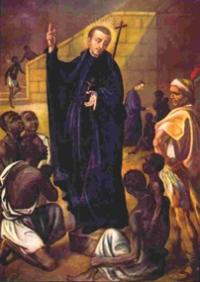
Feast day: 9 September
St Peter Claver was born in 1580 into a devout Catholic family who were prosperous farmers in the Catalan village of Verdu, which is about 87 kilometres from Barcelona. He was born seventy years after King Ferdinand of Spain began the practice of sending slaves to South America by buying two hundred and fifty African slaves in Lisbon.
He studied at the University of Barcelona where he was noted for his intelligence and piety. He wrote the following words in a notebook:
"I must dedicate myself to the service of God until death, on the understanding that I am like a slave."
When he had finished his studies Peter entered the Society of Jesus at the age of twenty. When he had completed the novitiate, he was sent to study philosophy at Palma, Majorca. There he met the saintly lay brother Alphonsus Rodriguez, who felt God had told him that the young man was destined for the New World ministry; he urged him to accept the calling. Peter volunteered for the Spanish colonies and was sent to the Kingdom of New Granada, where he arrived at the port city of Cartagena in 1610. He was required to spend six years before being ordained a priest while he did his theological studies. He lived in the Jesuit houses of Bogota and Tunja. Soon he became deeply distressed at the harsh treatment meted out to the African slaves. Since the native people were considered unsuitable physically to work in the gold and silver mines, Africans from Angola and the Congo were in demand. There was an enormous profit to be made in the slave trade. They were bought in West Africa for four crowns a head and sold in America for two hundred crowns apiece. Sometimes they were simply captured.
Cartagena was a slave trading hub: 10,000 slaves came into the port every year. A third died in transit because the conditions were so appalling. Pope Paul III had condemned the slave trade and Urban VIII had issued a papal decree prohibiting it, but it continued to flourish. Father Alonso de Sadoval SJ had worked for forty years with the slaves learning their customs and languages. He became Peter’s mentor. When he returned to Seville he wrote a book in 1627 about the African culture. When he was solemnly professed in 1622 Peter signed his final profession document in Latin, "Petrus Claver aethiopum semper servus" (Peter Claver servant of the Ethiopians, [i.e. Africans] forever).
He would head for the wharf as soon as a slave ship entered the port. The holds were filthy and the occupants, who had endured a terrible journey, were crammed tightly together. Peter wore a cloak which he often gave to someone in need. There was a legend that anyone who wore the cloak was cured of all disease for his lifetime. When the slaves left the ship to be sold in the market, Peter followed them bearing medicine, food brandy. tobacco, lemons and bread. With the help of interpreters and pictures he gave them basic instructions. One of his quotations was:
"We must speak to them with our hands before we speak to them with our lips".
He cleansed and dressed the sores of the sick and tended to them.
He saw the slaves as fellow Christians and encouraged others to do the same. When there were no slave ships he travelled round the country visiting the plantations to give consolation to the slaves. He is estimated to have baptized 300,000 people during his forty year ministry. He would always follow up on his converts to ensure that as Christians they received their rights. He also would preach in the town square to people other than slaves. When he visited the plantations, he avoided staying with the owners and lived instead in the slave quarters.
His ministry, however, extended far beyond the slaves and the townspeople to Muslims and English Protestants and those condemned to death for which he would spiritually prepare them. He also visited the hospitals. His work bore fruit and the slaves’ situation slowly improved. The well-to-do Spanish wanted Peter to minister to them too but the ladies complained about the smell the slaves left in the confessional. They were told that they could go to another confessor but they wanted to confess to him. However in spite of agreeing to share the same confessional as the slaves, they were made to wait till all the African women had confessed.
In his last years Peter was too ill to leave his room. He lingered four years and was starved and physically abused by an ex slave who had been appointed by the Superior of the house to look after him. He never complained about this treatment, feeling it was reparation for his sins. He died on 8 September 1654. The city magistrates, who had previously considered him a nuisance, ordered a public funeral with pomp and ceremony.
He was canonized by Pope Leo XIII in 1888 along with his mentor Alphonsus Rodriguez. His body lies under an altar in the church of the Jesuit residence in Cartagena, now renamed in his honour.
St Peter Claver, patron of missionary work among the African peoples, pray for us.